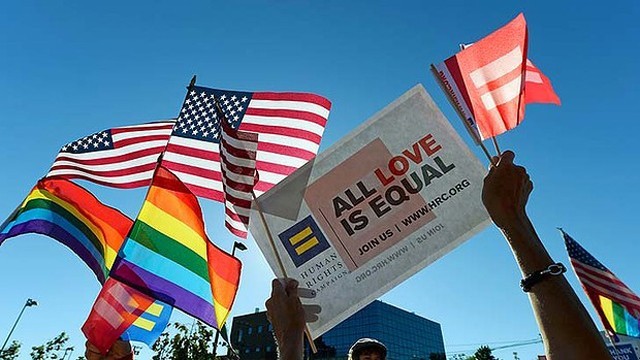Support: 51 per cent of Americans favour same-sex marriage. Photo: Getty Images/AFP
Forty-four years to the day after drag queens stood their ground against a police raid on the Stonewall Inn, sparking rioting in New York and marking the beginning of America’s gay rights movement, America’s highest court at last held that a key section of the Defence of Marriage Act is unconstitutional.
Amazingly, since Stonewall, the question of lesbian, gay, bisexual, and transgender (LGBT) rights has evolved from whether homosexuals should have any place in our society to whether gay and lesbian couples should be accorded equal marital stature.
It often boils down to a … negative response to something unfamiliar.
Whenever one group discriminates against another, it often boils down to a visceral, negative response to something unfamiliar. I call this the ”ick”, which is often at the base of the politics of exclusion.
In March, for example, a young woman at a rally in Washington against same-sex marriage was asked to write down why she was there. Her answer: ”I can’t see myself being with a woman. Eww.”
Frankly, as a gay man, I can’t see myself being with one, either.
But it’s usually not gays who write the laws. If this woman were in Congress, her discomfort might infect her thinking – and her law-making. Gays kissing?
Ick.
The Supreme Court may be the ultimate interpreter of the rules, but it is still the court of public opinion that matters.
And public opinion has shifted – 51 per cent of Americans favour same-sex marriage, a recent Pew Research Centre poll shows, and 42 per cent oppose it.
Reflecting this slim majority, Wednesday’s five-to-four ruling made clear that ”ick” is not a proper basis for constitutional jurisprudence.
Justice Anthony Kennedy, in his opinion, warned against this, noting that when ”determining whether a law is motived by an improper animus … ‘[d]iscriminations of an unusual character’ especially require careful consideration.” Kennedy was not prepared to allow the ”ick” to remain law, knowing that the result was often embarrassing when judged by history.

Rainbow-coloured world: Celebration in San Francisco after the US Supreme court rulings. Photo: Reuters
For more than 70 years, I’ve watched the ”ick” infect American life in a variety of ways and concluded that it’s little more than a function of unfamiliarity. Once upon a time, you never saw two men kissing.
Even I was taken aback the first time I saw two men being affectionate in public. The ”ick” runs deep, instilling unease even in those for whom an act is natural. When I was a child, I knew that my sexuality was not something I could reveal to others.
Later, as a young actor, I knew I could not be open about it without serious consequences for my career. It wasn’t until 2005 – when I was in my late 60s – that I came out.
But the ”ick” goes beyond LGBT issues.
It once blocked public displays of interracial affection.
A white person didn’t kiss a black person on American television until 1968 – on Star Trek when Captain Kirk kissed Lieutenant Uhura.
That was quite controversial. Indeed, two decades before that kiss, when I was growing up in California, it was illegal for Asians and whites to marry. Now I’m married to a white dude.
How times have changed.
To help justify the ”ick,” many turn to the Bible, perhaps because science doesn’t lead to the conclusion that homosexuality is unnatural.
As one saying goes, homosexuality is found in more than 400 species, but homophobia in only one. But references to religious texts are not a solid footing on which to base notions of traditional marriage.
Concerns about the separation of church and state aside, traditional marriage has never been what its homophobic proponents believe.
As author Ken O’Neill reminds us, the fact that you can’t sell your daughter for three goats and a cow means we’ve already redefined marriage.
Because social mores change with each generation, the ”ick” is not effective at preventing changes to our institutions.
Importantly, same-sex marriage is supported by a majority of young people: a recent Field Poll in California showed that 78 per cent of voters under the age of 39 favour marriage equality.
Future generations will shake their heads at how narrow, fearful and ignorant we sounded today debating the Defence of Marriage Act. Happily, the majority of our justices understood this and did not permit the ”ick” to stick.
George Takei, an actor and activist, played Mr Sulu on Star Trek and is the author of Oh Myyy! There Goes the Internet.
Author: George Takei
Publication: The Washington Post
Date: 29 June 2013

